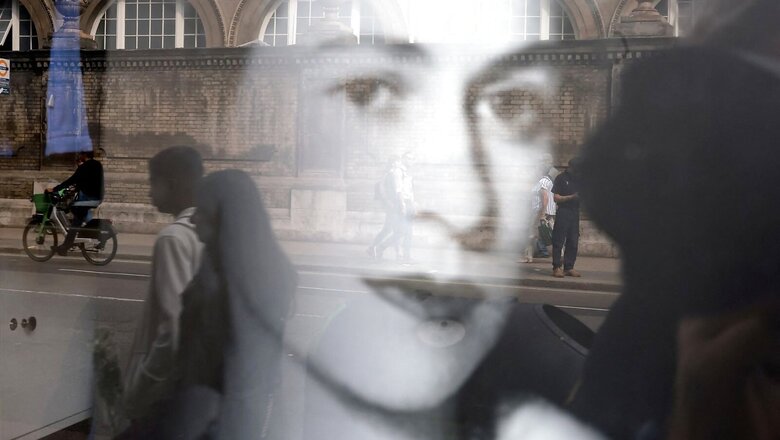
views
Queen Elizabeth II’s long life and reign has come to an end. While the UK will finally bid adieu to its beloved monarch today on her funeral, it is necessary to note that she was not just the Queen of the United Kingdom, but also of 14 other countries, including Canada and others in Asia and the Caribbean. These are referred to as the Commonwealth realms and are distinct from the Commonwealth of Nations, a loose confederation of 54 former British Empire countries, the majority of which are no longer subjects of the monarchy.
Now, as Charles III ascends the throne, things may begin to change. Countries under the Commonwealth realm house complicated emotions towards the British monarchy, despite holding respect for its representational figures. The debate has already ignited, and in an era defined by the anti-racist movement of ‘Black Lives Matter’ (that started in the US and gained worldwide support), the colonial ‘London bridge’ may also soon ‘fall down’.
News18 explains the complicated past and debate in these countries, and what may happen:
Australian Lawmaker Calls It ‘Time to Move Forward’, Canada Ambivalent
Adam Bandt, the leader of Australia’s Greens party, sparked outrage recently by declaring that “now Australia must move forward,” with many calling his timing “graceless.” However, according to a report by AFP, A sizable proportion of the population supports Australia’s declaration of independence. A June survey by a company Essential found that 44 per cent of Australians supported the country becoming a republic.
The emotion is apparently similar in Canada, where according to a poll conducted in April this year by the non-profit and non-partisan Angus Reid Institute, 51 per cent of Canadians who oppose having the British Monarch as the head of their state “for generations to come,” whereas 26% who support the move. According to the poll, 67% of Canadians oppose Charles as Canada’s King and official head of state, said a report by Forbes.
And according to a report by AFP, while Canadians were devoted to Queen Elizabeth II until the end, their relationship with the monarchy had become increasingly strained, and her death on Thursday is expected to reignite debate about the monarchy’s future. “Canada is a monarchist outlier in the middle of a rather republican continent,” Marc Chevrier, a professor of politics at the University of Quebec in Montreal told the publication.
“The debates will resurface, Pandora’s box will open,” he said, “after a few weeks of mourning”.
While the country is going ahead with a proper ceremonial mourning, the country has been ‘increasingly ambivalent’ towards displaying pomp for the monarchy. “Even in English-speaking Canada, support for the monarchy has diminished over the years,” Philippe Lagasse, a professor at Carleton University in Ottawa and expert on the role of the monarchy in Canada told AFP.
Barbados Recently Left the Realm, Could Canada Follow?
Barbados, in the Caribbean, became the most recent country to dethrone the British monarch and establish a republic last year. The then-Prince Charles attended the transition ceremony, where he spoke about the “appalling atrocity of slavery” that the Caribbean island faced under British rule, the report by Forbes said.
But to follow in the footsteps of Barbados, Canada would need to implement major institutional and constitutional reforms. “The monarchy is the keystone of all constitutional law,” Chevrier told AFP, calling it ‘a founding principle at the birth of Canada in 1867’. He pointed out, for example, that “the office of prime minister does not even appear in the Canadian constitution, which only mentions the monarch.”
Amending the constitution and abolishing the monarchy would necessitate a massive effort and potentially years of political wrangling, as it would necessitate the unanimous approval of both Parliament and the governments of all ten Canadian provinces.
In a politically divided Canada, such a debate would almost certainly be heated. Then, according to Lagasse, all royal symbolism could be targeted in order to further sever ties with the British monarchy. The image of Queen Elizabeth can be found on Canadian coins and $20 bills, for example. Certain protocols, particularly the oath of citizenship, would also have to change. New Canadian citizens must pledge “allegiance to Her Majesty Queen Elizabeth II, Queen of Canada, and to her heirs and successors.” A trio of immigrants unsuccessfully challenged the oath in court in 2014, claiming it violated their religious and conscientious beliefs.
However, Canada’s Prime Minister Justin Trudeau refused today to reopen the constitutional debate about the role in his country of the British monarchy, whose sovereign is automatically the Canadian head of state. “For me, it’s not a priority. It’s not even something that I consider discussing,” Trudeau said in an interview in London with Radio-Canada, on the eve of Elizabeth’s funeral.
“To make such a profound change in a system that is among the best, the most stable in the world, for me, now, it’s not a good idea.”
Things Stirred Up in Other Countries
Even New Zealand Prime Minister Jacinda Ardern, who described the late monarch as “extraordinary,” has previously stated that her country will become a republic within her lifetime. In the Caribbean, where British rule is linked to a history of slavery, and Prince William and his wife Kate were met with protests and calls for an apology and slavery reparations during a recent visit, the report by Forbes said.
And Jamaica, the Commonwealth realm’s most populous Caribbean nation, began the process of transitioning into a republic in June and is expected to remove the British monarch as its head of state before the next general election in 2025.
Could Charles Abdicate to Keep Things in Order?
Despite political experts saying that Charles would have to be neutral to keep his country and realm together, neutrality could prove difficult in Scotland, where nationalists are pushing for another referendum on independence to break up the United Kingdom, while saying they would keep the monarchy.
Opinion polling by YouGov shows the prospect of Charles as monarch divides British public opinion almost equally. In 2022, just under a third of respondents said he would not make a good king, while almost exactly the same proportion said he would.
By contrast, over 80 percent say the queen has done a fairly good or very good job. Support for a republic has stood at a meagre 15 percent in the past two years.
But the pressure group Republic began a billboard campaign in mid-2021 calling for the abolition of the monarchy.
Chief executive Graham Smith predicted Charles’s accession would be “a major turning point”, with Barbados already ditching the UK monarchy in November 2021 and Australia now under a pro-republic government. “He’s not protected by the almost impenetrable shield of deference that surrounds the queen,” Smith said.
One recurrent call heard from some of the public is for Charles to abdicate in favour of his 40-year-old son William. Hazell said while Elizabeth II would never have abandoned her pledge of lifetime service, Charles could “conceivably” do so.
There is precedent in Europe: Belgium’s king Albert stood down in 2013, at 79, in favour of his son, as did Juan Carlos I of Spain, the following year.
With inputs from AFP
This story was originally published on September 10, 2022.
Read all the Latest Explainers News and Breaking News here



















Comments
0 comment